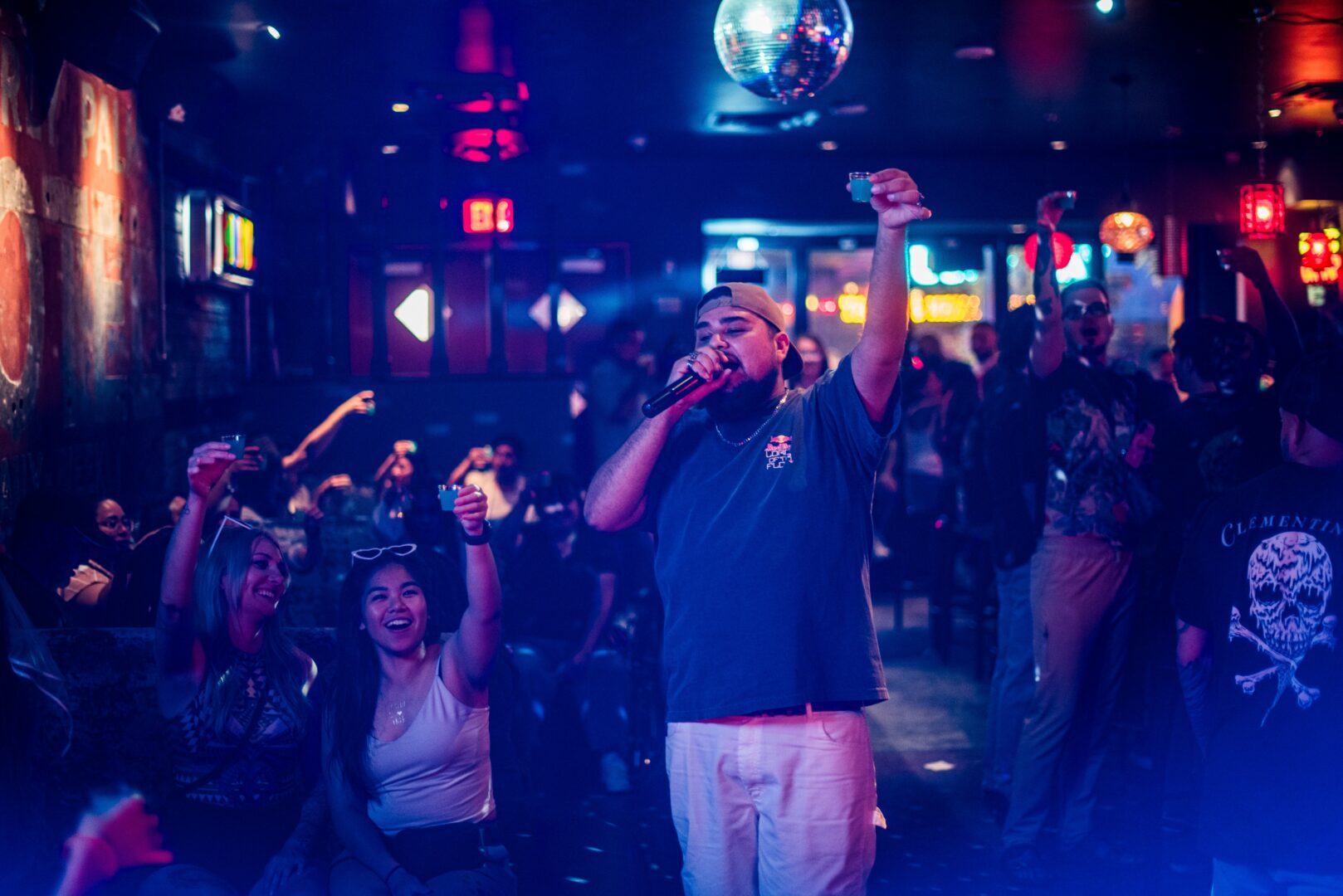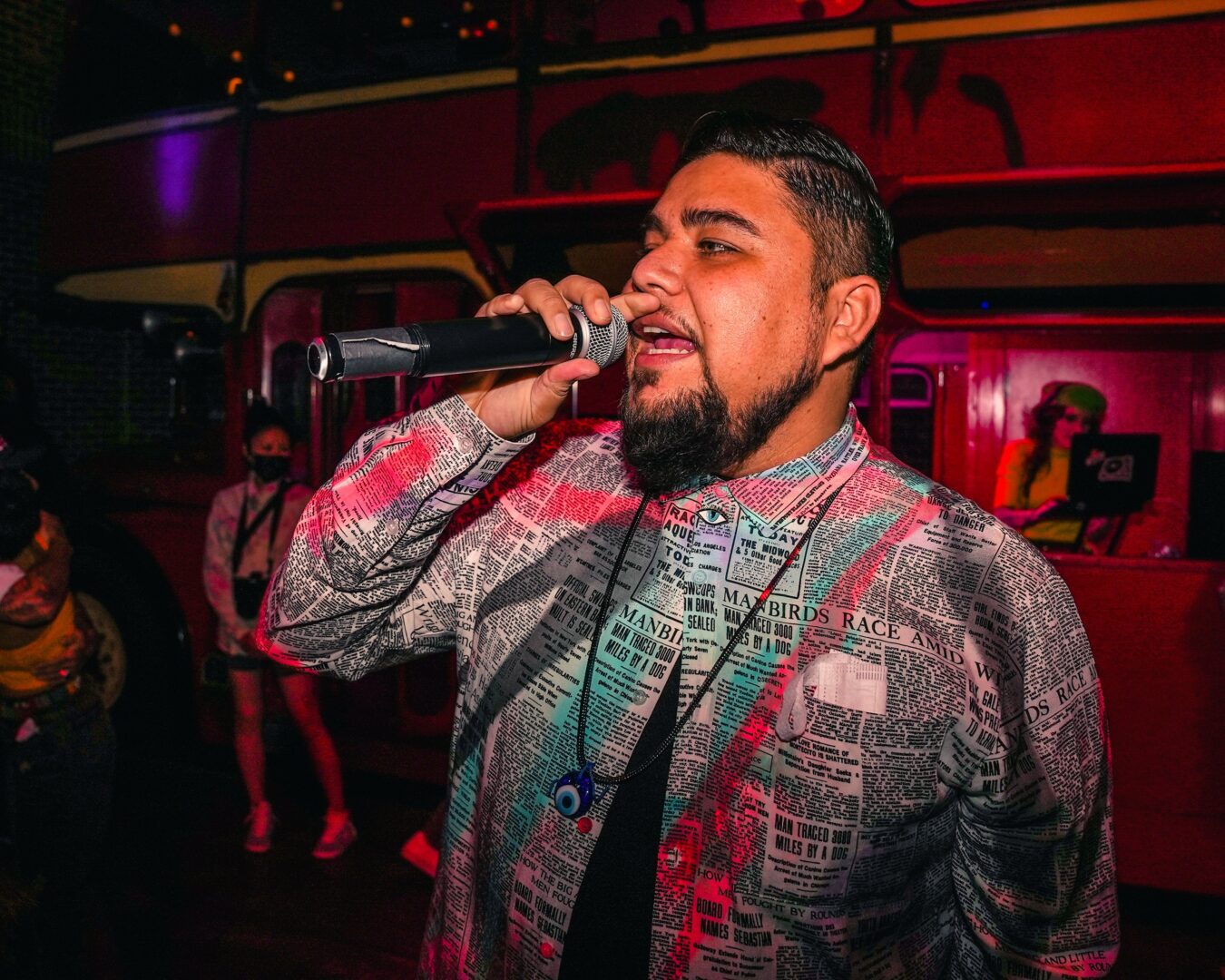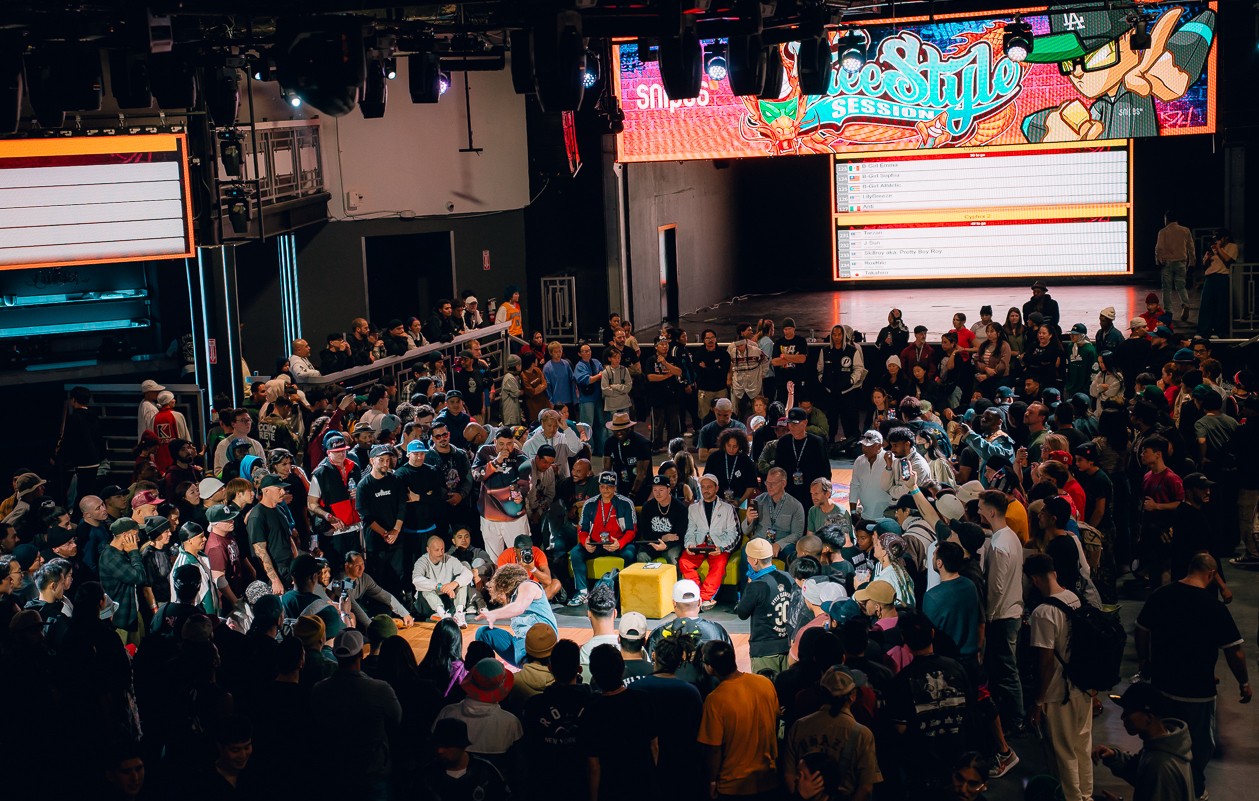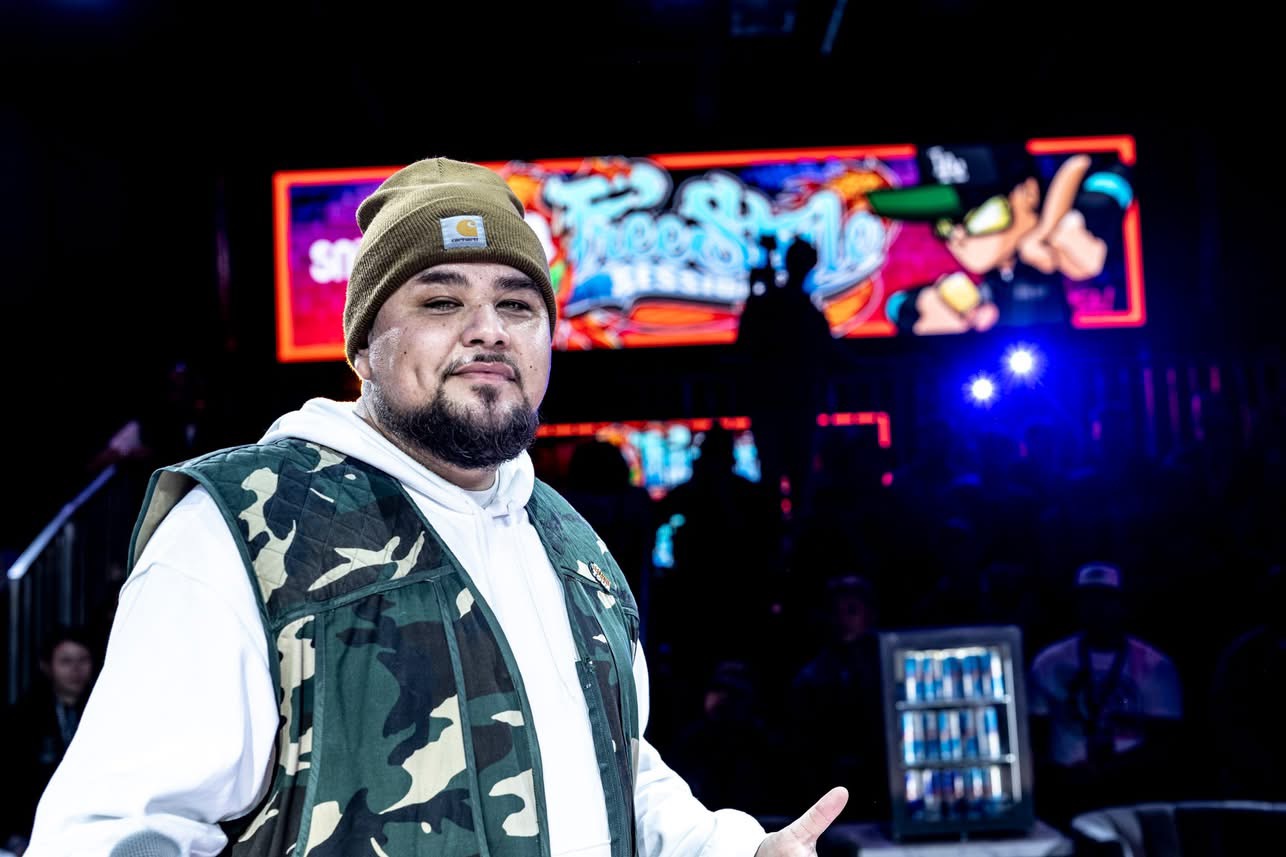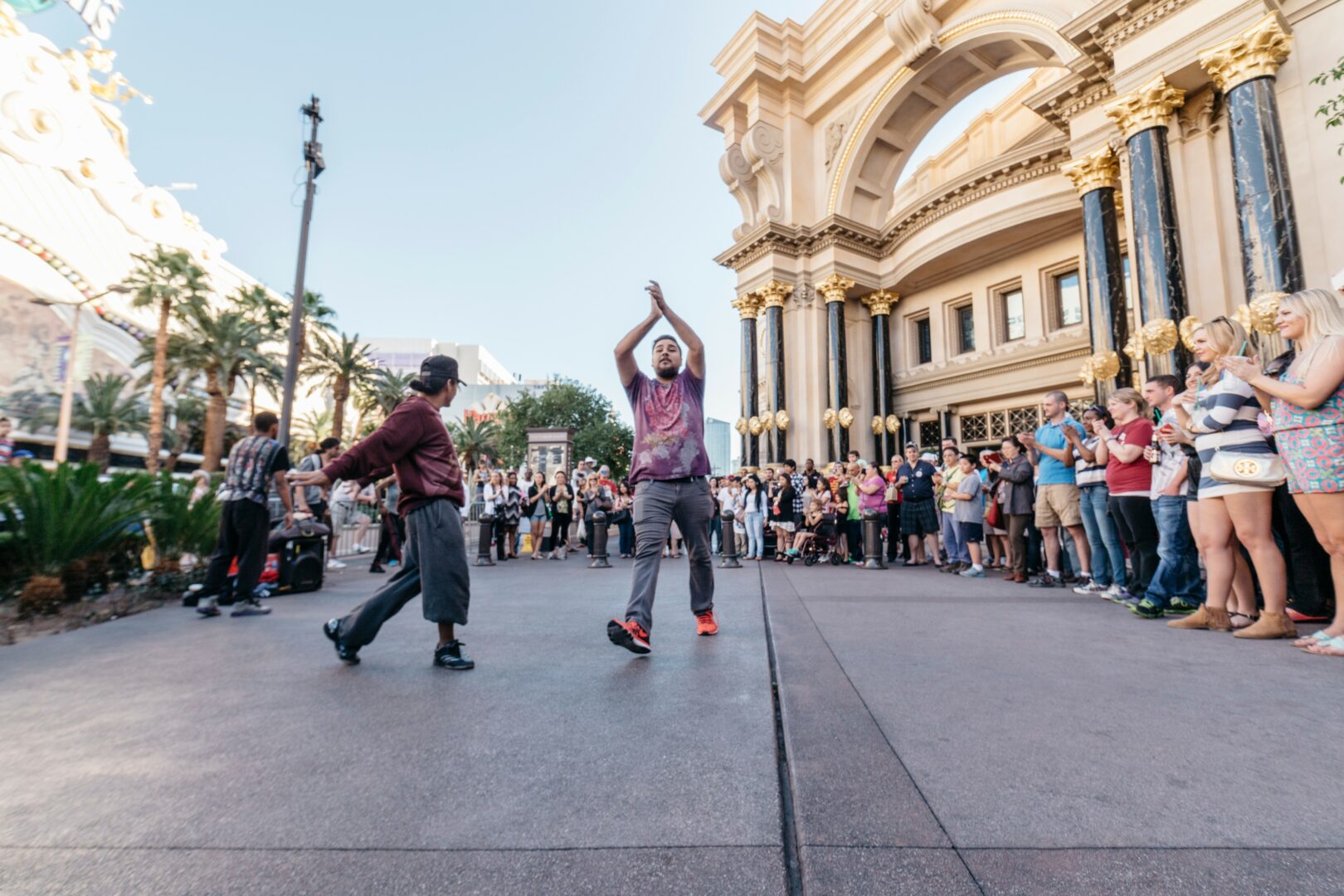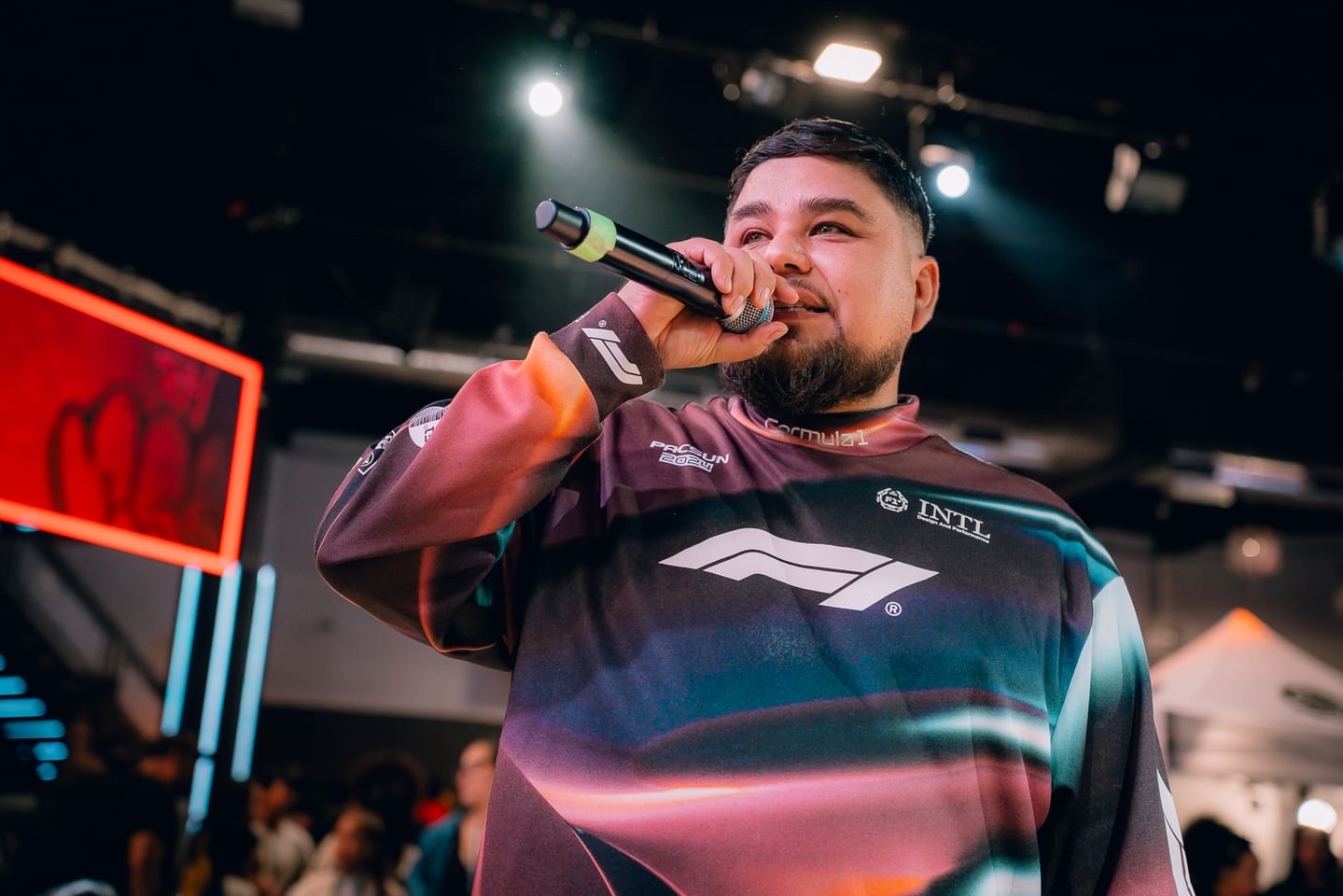We’re excited to introduce you to the always interesting and insightful Arturo aka M.P. ART Cecena. We hope you’ll enjoy our conversation with Arturo aka M.P. ART below.
Arturo aka M.P. ART , we’re so excited for our community to get to know you and learn from your journey and the wisdom you’ve acquired over time. Let’s kick things off with a discussion on self-confidence and self-esteem. How did you develop yours?
I like to think I was raised by two things: my grandparents and a killer soundtrack. I grew up in a Mexican-American household with my grandparents on my mom’s side, starting from when I was just six months old. Our home wasn’t just a place to sleep—it was the heart of the family, the place where everyone gathered for birthdays, holidays, and random Sundays that turned into full-blown parties. My grandfather was a radio announcer for a Mexican station, so our house was always alive with the sound of mariachi, rancheras,, cumbias and classic boleros. Meanwhile, my youngest uncle, Marvin, was a DJ, breakdancer, and the family’s resident hype man. He brought in the funk—literally. Think 80s and 90s hip hop, funk, early dance music, and all the vibes from the golden era of MTV. One minute it was Vicente Fernández, the next it was Michael Jackson or Run-D.M.C.—and somehow, it all made sense.
My older brother, who went by the name Mystical Popper (yes, it’s as cool as it sounds), was also a dancer who specialized in popping. Between him and Uncle Marvin, our living room felt like Soul Train met a backyard quinceañera. Watching them move, entertain, and just own the room taught me something invaluable: confidence is an energy you create and share. It’s not about being the loudest—it’s about knowing how to read a room and then lift it.
Because our house was the go-to party spot, I naturally picked up the role of host-in-training. I saw how my uncle kept people laughing, how my brother captivated attention without saying a word—just through movement—and how music connected generations. Over time, I realized I didn’t need to find confidence; I just needed to channel the family energy that raised me.
So when people ask me where my confidence comes from, I always say: from my uncle Marvin and big brother Francisco the original Mystical Popper : side note thats what the M.P. in M.P. Art stands for.
Thanks for sharing that. So, before we get any further into our conversation, can you tell our readers a bit about yourself and what you’re working on?
Short Version? My Brand Is Me M.P.Art. But the Story? That’s Where the Magic Is. I’ve always had one foot in the art world and the other in the cypher. In high school and college, I was an art major who loved to draw, paint, and express myself. “M.P.Art” started as a simple abbreviation of my name on sketchbooks and canvases.
Then, on a whim, I signed up for a public speaking class never realizing I had just stepped into what would eventually become my life’s calling: rockin the mic.
As I got deeper into hip hop culture and started entering dance battles, “M.P.Art” evolved into my alias. It was shorter, punchier and honestly, it just had a nice ring to it. I’d tag it on battle sign-up sheets and hear it shouted during intros. Over time, it became more than a name it became a persona.
My first official hosting gig was in Las Vegas at a legendary venue called Insert Coins, for an event called Dance Therapy, curated by DJ Miss Joy. That night sealed it for me. The mic felt right. The crowd responded to my energy and lit me up. And “M.P.Art” stuck for good.
Fast forward to today: I’ve been a host in the industry for over a decade. I’ve blessed the mic at everything from downtown dive bars to clubs on the Strip from underground street dance battles to art shows, concerts, weddings even a boxing match. My weekly and monthly residencies have real staying power some running strong for 7 to 10 years. One of those events, Boozy Bingo at Corduroy in downtown Las Vegas, was just awarded Best Game Night by Las Vegas Weekly.
Right now, my main focus is capturing that journey and helping others find their voice too. I’m gathering testimonials from professionals in the scene, people who’ve seen me work live and up close, asking them: What makes a great host? Side note: my first testimonial came from Vegas’ own Jo Koy, a world-famous comedian.
I’m using those insights to build something bigger: a how-to guide and online course for aspiring MCs and event hosts. Because let’s be real there’s no YouTube playlist that teaches you how to hold space, manage energy, and keep a crowd locked in without forcing it.
In addition to hosting, I help coordinate and produce events through my art collective Raow Raow and our community brand There’s Nothing To Do In Las Vegas (NTDLV.com) which, ironically, is helping prove the exact opposite. That work gives me a behind-the-scenes lens on how events get made, and how to move through this industry like a pro without losing your soul (or your voice).
By 2026, I plan to release a book and launch the online course, sharing everything I’ve learned from mic technique to energy control to how to walk into a room and own it without ego.
At the end of the day, I don’t just host events I hold space. And in that space, I aim to make people feel seen, heard, and hyped. All the things that make Me / M.P, Art unique.
Looking back, what do you think were the three qualities, skills, or areas of knowledge that were most impactful in your journey? What advice do you have for folks who are early in their journey in terms of how they can best develop or improve on these?
Great question. If I had to boil it down, I’d say the three biggest game-changers on my hosting journey were: being prepared, being present, and being a student of the moment—always learning.
First up: be prepared.
I learned early on that hosting isn’t just about grabbing a mic and sounding cool, it’s about knowing your room. When I started researching every element of the event, who the DJ was, the performers, even the bar staff and security.
Second: be present.
Hosting means being the pulse of the room. You can’t do that if you’re off in the corner checking your phone or not reading the energy. I’ve had nights where a technical issue killed the music mid-set but because I was tuned in, I jumped in with crowd banter, hyped the bar specials, and by the time the DJ came back, the vibe hadn’t dropped an inch. Presence is power. You don’t have to control everything you just have to respond in real time.
Third: use every experience as a lesson.
The good nights, the off nights, the unexpected moments they all teach you something. Hosting is a journey, there’s no final destination. You get sharper with each mic check and each misstep. I’ve bombed intros, forgotten names, and had jokes flop. But I took notes, stayed humble, and came back better.
And honestly? Hosting is a journey, not a destination. There’s no “final form.” It’s about learning how to lift a room, read the energy, and bring people together. You can’t host without a crowd—so it’s never about you, it’s about us. When you really internalize that, you’re hosting goes from good to next level.
Lastly, and I can’t stress this enough—be patient, kind, and forgiving with yourself. There will be off nights. There will be doubts. But if you stay steady, stay learning, and stay connected to why you’re doing it—you’ll go far. And if you can make people feel seen, heard, and hyped? You’re already winning
Okay, so before we go, is there anyone you’d like to shoutout for the role they’ve played in helping you develop the essential skills or overcome challenges along the way?
Well, as I mentioned earlier—it started with my family. That foundation was everything. But beyond that, I have to give credit where it’s due: Hip hop raised me. The emcees I grew up listening to like Melle Mel, Black Star (Mos Def and Talib Kweli), Nas, A Tribe Called Quest, Souls of Mischief, The Pharcyde,& the Wu-Tang Clan have all played a huge role in shaping my mindset and delivery as a host.
These weren’t just rappers to me, they were professors of rhythm and wisdom. Their lyrics taught me how to craft a message, how to control energy with voice and tone, and how to speak truth to power. For example, one of my biggest influences is Mos Def (now Yasiin Bey). His track “Umi Says” on Black on Both Sides hit me deep. Those lyrics “Tomorrow may never come For you and me, life is not promised. Tomorrow may never appear.You better hold this very moment very close to you (Right now) Very close to you (Right now) So close to you! (Right.. NOW!) Soooo close to you! Don’t be afraid, just let it shine. Shine your light for the world to see …” That stuck with me. That song alone gave me purpose every time I stepped to the mic. I wasn’t just hyping up the room, it was sharing light, making people feel seen. To Me that’s what it means to host with intention.
Then there’s my real life mentors. I’ve learned from watching and taking notes from some heavyweights in the hosting game. People like Mookie, Artson, and Danny Boy from The Get Back, who showed me what it means to control a room with presence and style. And of course, the one and only B-Boy Ivan, aka the Urban Action Figure. This man doesn’t just host—he becomes the event. His wordplay, energy, physical presence—it’s like watching a comic book super hero come to life. I’ve had the honor of co-hosting with him at Freestyle Session for over three years now, and every time I’m around him, I soak up something new. He’s a living legend, period. Shout out to Cros One for seeing my value and giving me that opportunity.
On the mentorship front, I’ve had two very different but equally important guides.
Bboy Moskito taught me the raw, unfiltered street game. He was the host and Ring Master of State of Shock, a street show crew here in Vegas back in 2013-2017. I was in the crew for three years, performing and learning the hustle of live street shows in front of casinos like Bally’s, Caesars, and The Mirage performing four to six shows a day, with hundreds of people in attendance. That was my hosting bootcamp: learning charisma, crowd control, and fearlessness.
Then there was Art Saenz back then he was better known as Image One. He gave me the polished side of the business. A true Hip Hop MC, promoter, and venue host, he was the first person who actually showed me how to hold the mic right and how to move professionally in event spaces. He put me up on game from logistics to etiquette to how to produce an event.
Moskito gave me the grit. Art gave me refinement. I’m still carrying both those lessons with me every time I touch the mic.
And when it comes to personal growth, I have to shout out Coco Jenkins. She’s not only a respected musician, songwriter, and producer in the Vegas cultural scene, she’s also the co-founder of There’s Nothing To Do In Las Vegas (NTDLV.com) which I’m proud to co-owner and a key member of the Raow Raow Art Collective that I’m also apart of. Coco has always challenged me to think about my impact. She reminds me that words have weight and that every mic moment is a chance to uplift or educate, not just entertain. Her influence helps keep grounded and my purpose aligned with my platform. Real talk, her guidance has pushed me toward my highest potential, both as a host and a human.
So yeah family, hip hop, legends in the game, street mentors, venue pros, and strong creative collaborators. I’m grateful to all of them. Because what I do now is really a reflection of what they poured into me.
Contact Info:
- Website: www.ntdlv.com
- Instagram: @mpartc @itsraowraow @nothingtodoLV
- Facebook: @mpart
- Youtube: @mpartc

